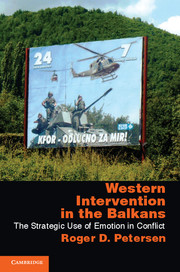Book contents
- Frontmatter
- Contents
- Acknowledgments
- Part 1 Background and Theory
- 1 Western Intervention in the Balkans
- 2 Emotions as Resources
- 3 The Strategic Use of Emotions, I
- 4 Intervention Games
- 5 The Strategic Use of Emotions, II
- 6 The Strategic Use of Emotions, III
- Part 2 Cases and Tests
- Appendix A A Note on Names
- Appendix B Alternative Arguments
- References
- Index
- References
4 - Intervention Games
from Part 1 - Background and Theory
Published online by Cambridge University Press: 05 June 2012
- Frontmatter
- Contents
- Acknowledgments
- Part 1 Background and Theory
- 1 Western Intervention in the Balkans
- 2 Emotions as Resources
- 3 The Strategic Use of Emotions, I
- 4 Intervention Games
- 5 The Strategic Use of Emotions, II
- 6 The Strategic Use of Emotions, III
- Part 2 Cases and Tests
- Appendix A A Note on Names
- Appendix B Alternative Arguments
- References
- Index
- References
Summary
For the past fifteen years, Western foreign policy rhetoric and philosophy have been dominated by the ideas of classical liberalism. In this worldview, two ideas stand out. First, there is the notion of universal progress. Humanity is making its way toward an ever better end state; in the words of President Bush, “freedom is on the march.”
A second key concept is the “social contract.” This idea is central to the present chapter. The primary goal of Western intervention is to design a social contract among the parties in conflict. In turn, the creation and implementation of these social contracts resembles the structure of certain rational choice “games.” These games consist of a few basic elements: specification of actors, their preferences, and their possible actions. The Western approach to intervention, I argue, is to construct the “game” and its component parts with a narrow view of rationality. Opponents of the game, on the other hand, often use the emotions specified in the last chapter as resources to alter the game and its basic elements. In this competition, the strategic use of emotion and the Western intervention game are inextricably linked.
- Type
- Chapter
- Information
- Western Intervention in the BalkansThe Strategic Use of Emotion in Conflict, pp. 64 - 79Publisher: Cambridge University PressPrint publication year: 2011



